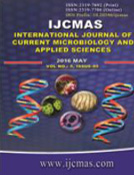


 National Academy of Agricultural Sciences (NAAS)
National Academy of Agricultural Sciences (NAAS)

|
PRINT ISSN : 2319-7692
Online ISSN : 2319-7706 Issues : 12 per year Publisher : Excellent Publishers Email : editorijcmas@gmail.com / submit@ijcmas.com Editor-in-chief: Dr.M.Prakash Index Copernicus ICV 2018: 95.39 NAAS RATING 2020: 5.38 |
The aim of this study was to assess the response of patients with SBP to third-generation cephalosporins in Nile delta. Current international guidelines recommend the use of a third-generation cephalosporin for empirical treatment of SBP. However, reports about antibiotic resistance for third-generation cephalosporins increased dramatically. Which raise the questions about these guidelines and if they are still valid. One hundred patients with liver cirrhosis, ascites and first episode of SBP signed informed consent to participate in this study. They were admitted to Department of Tropical Medicine and Infectious diseases-Tanta University hospital for one week during the period from January to December 2014. The patients were randomly assigned to receive either cefotaxime 2 gm every 12 hours or ceftriaxone 2 gm every 24 hours. Their ascitic fluid samples were re-examined after 48 hours and after 5 days to assess the response to third-generation cephalosporins. On assessment of the response to third-generation cephalosporins after 48 hours, 65% of patients had satisfactory response (decrease 25% at least in PMNL count) while 35% did not achieve a satisfactory response and were shifted to another antibiotic. After 5 days, only 46/65of initial responders achieved complete response. Ceftriaxone had higher response rates than Cefotaxime. However, this difference was non-significant. Based on our study, There is a dramatic decrease in the response rate of SBP to third-generation cephalosporins. This marked decrease in the response should be watched closely as it suggests re-considering of the current guidelines for empiric therapy in SBP. (Clinical Trials.gov Identifier: NCT02443285).
 |
 |
 |
 |
 |